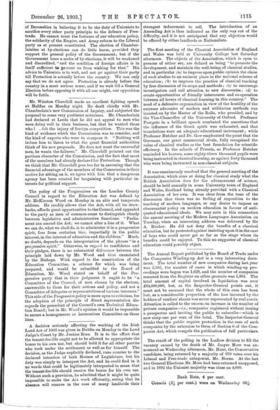The policy of the Progressives on the London County Council
in regard to the Education Act was defined by Mr. McKinnon Wood on Monday in an able and temperate address. He readily allows that the Act, with all its draw- backs, affords great opportunities to the Council, and appealed to the party as men of common-sense to distinguish clearly between legislative and administrative functions. "Parlia- ment can amend the Act; we cannot alter a line of it. What we can do, what we shall do, is to administer it in a progressive spirit, free from sectarian bias, impartially in the' public interest, in the interest of education and the children." Much, no doubt, depends on the interpretation of the phrase "in a progressive spirit." Otherwise, in regard to candidates and their pledges, there is no substantial difference between the principle 'laid down by Mr. Wood and that enunciated by the Bishops. With regard to the constitution of the Education Committee, a scheme for which was being Prepared, and would be submitted to the Board of Education, Mr. Wood stated on behalf of the Pro- gressive party that in their judgment it ought to be " a Committee of the Council, of men chosen by the electors, answerable to them for their actions and policy, and not a Oommittee of delegates or representatives of various interests." This side of the Progressive policy is more open to criticism, for the adoption of the principle of direct representation dis- regards the precedent of the Council's own Technical Educa- tion Board; but in Mr. Wood's opinipn it would be impossible to secure a homogeneous or harmonious Committee on these lines.






































 Previous page
Previous page